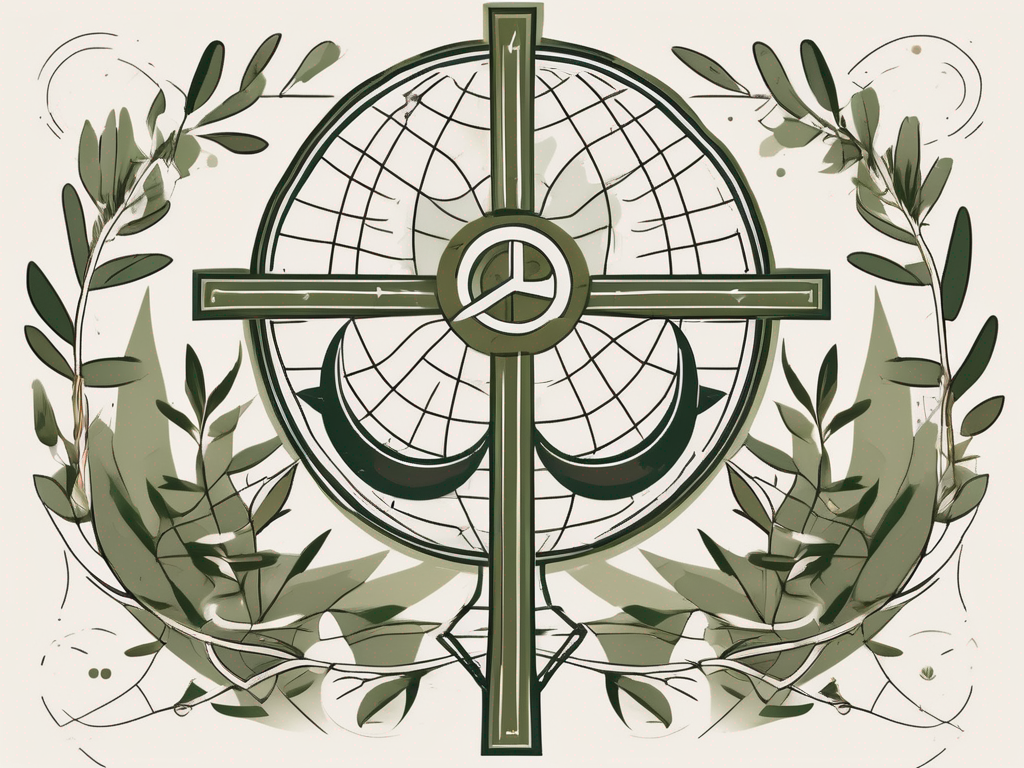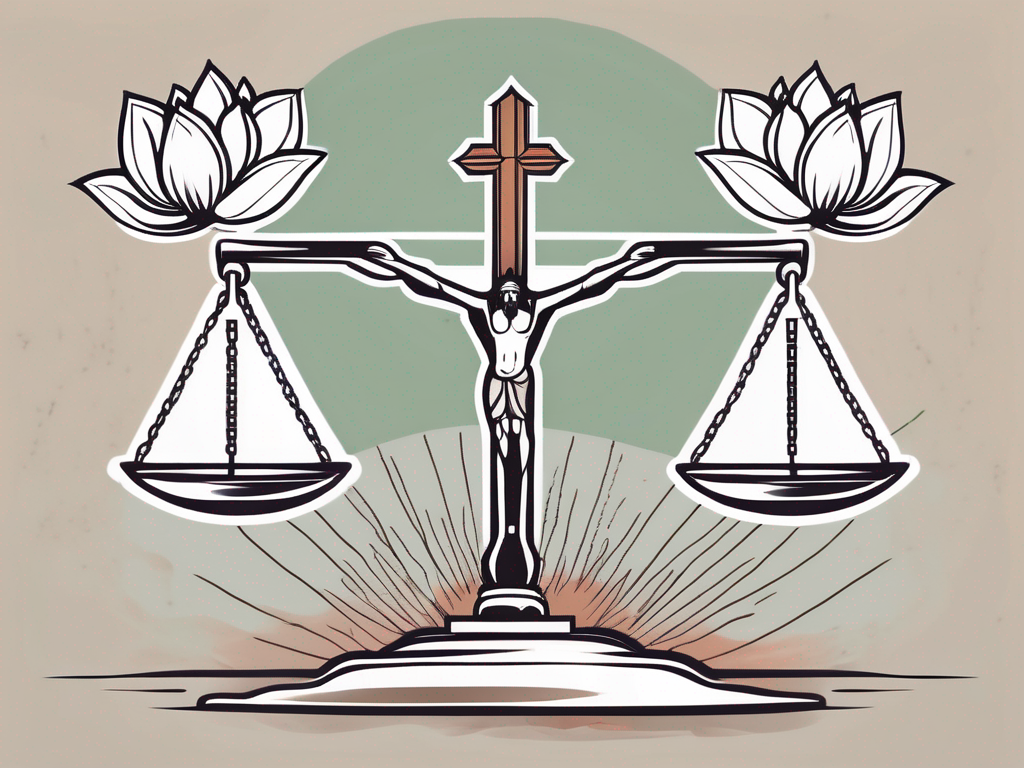In today’s diverse world, religion plays a significant role in shaping societies and individuals. Two of the most influential religions with millions of followers worldwide are Christianity and Islam. While both share similarities, their differences are also pronounced. In this article, we will take a closer look at the core beliefs, historical context, theological differences, practices and rituals, as well as sacred texts of Christianity and Islam.
Understanding the Basics of Christianity and Islam
Core Beliefs and Teachings of Christianity
Christianity, with its roots in the teachings of Jesus Christ, believes in the existence of one eternal God who is loving, all-powerful, and all-knowing. Christians adhere to the belief that Jesus is the Son of God who came to Earth in human form to save humanity from sin. The Bible, consisting of the Old Testament and the New Testament, serves as the sacred text for Christians, guiding their faith and practices.
Christianity emphasizes love, forgiveness, and the importance of compassion towards others. Jesus’ teachings of peace and goodwill are central to Christian beliefs. The Sermon on the Mount, found in the New Testament, is a significant teaching of Jesus that highlights the values of humility, mercy, and righteousness.
Within Christianity, there are various denominations and traditions that interpret and practice the faith differently. Some emphasize sacraments, such as baptism and communion, as essential rituals for spiritual growth and connection with God. Others focus on the power of prayer and personal relationship with God. Despite these differences, the core belief in Jesus as the Son of God and the importance of living a virtuous life remain central to all Christian denominations.
Fundamental Principles and Teachings of Islam
Islam, on the other hand, emerged in the 7th century CE in the Arabian Peninsula through the revelations received by Prophet Muhammad. Muslims believe in one God, Allah, who is merciful and compassionate. The Quran, the holy book of Islam, is considered the literal word of God and serves as the primary source of guidance for Muslims.
Islam emphasizes submission to the will of Allah and following the Five Pillars of Islam: Shahada (faith), Salah (prayer), Zakat (charity), Sawm (fasting), and Hajj (pilgrimage to Mecca). These pillars provide a framework for Muslims to express their faith and devotion to Allah. Prayer, performed five times a day, serves as a means of connecting with God and seeking His guidance.
In addition to the Five Pillars, Islam places great importance on moral values such as honesty, justice, and compassion. Muslims are encouraged to show kindness and generosity towards others, especially the less fortunate, as acts of charity are seen as a way to purify one’s wealth and attain spiritual growth.
Islamic teachings also emphasize the concept of the ummah, the global community of Muslims. This sense of unity and brotherhood encourages Muslims to support and care for one another, regardless of nationality, race, or social status.
It is important to note that within Islam, there are different schools of thought and interpretations of religious practices. These variations reflect the diversity of Muslim cultures and traditions around the world while maintaining the fundamental principles of the faith.
The Historical Context of Christianity and Islam
The Birth and Spread of Christianity
Christianity traces its origins back to the life and teachings of Jesus Christ in the 1st century CE. Jesus’ message of love and salvation attracted many disciples who spread his teachings across the Roman Empire and beyond. Despite persecution and challenges, Christianity gained momentum over the centuries, becoming the dominant religion in Europe and later spreading worldwide through colonization.
The historical context of Christianity includes the formation of various denominations, each with its own interpretations of the faith. These divisions have given rise to diverse traditions, practices, and beliefs within the Christian community.
One significant event in the historical context of Christianity is the Council of Nicaea in 325 CE. This council, convened by Emperor Constantine, aimed to resolve theological disputes and establish a unified understanding of Christian doctrine. It resulted in the formulation of the Nicene Creed, which defined the core beliefs of Christianity and solidified the authority of the Church.
Another important aspect of the historical context of Christianity is the Protestant Reformation in the 16th century. This movement, led by figures such as Martin Luther and John Calvin, challenged the authority of the Catholic Church and called for reforms in doctrine and practice. The Reformation led to the establishment of various Protestant denominations, further diversifying the Christian landscape.
The Emergence and Expansion of Islam
Islam began with Prophet Muhammad receiving revelations from Allah in the 7th century CE. The religion quickly gained followers in the Arabian Peninsula and expanded through military conquests and trade routes. Within a century, Islam spanned across the Middle East, North Africa, and parts of Europe, establishing a vast empire.
The historical context of Islam includes the division between Sunni and Shia Muslims, which arose due to disagreements over succession after the death of Prophet Muhammad. This division has influenced religious practices and governance structures in many Islamic societies.
One notable event in the historical context of Islam is the Battle of Karbala in 680 CE. This battle, fought between the forces of the Umayyad caliphate and the supporters of Imam Hussein, the grandson of Prophet Muhammad, resulted in the martyrdom of Imam Hussein and solidified the divide between Sunni and Shia Muslims. This event holds great significance in Shia Islam and is commemorated annually during the month of Muharram.
Another significant aspect of the historical context of Islam is the Islamic Golden Age, which occurred from the 8th to the 14th centuries. During this period, Islamic civilization flourished in various fields such as science, mathematics, philosophy, and literature. Scholars like Ibn Sina (Avicenna), Al-Farabi, and Ibn Rushd (Averroes) made significant contributions to human knowledge, influencing subsequent intellectual developments in Europe.
Exploring the historical context of Christianity and Islam reveals the rich tapestry of events, ideas, and individuals that have shaped these religions. From the early disciples of Jesus to the intellectual giants of the Islamic Golden Age, the stories and influences behind these faiths continue to captivate and inspire people around the world.
Theological Differences and Similarities
Concept of God in Christianity and Islam
In Christianity, God is believed to be a Trinity, consisting of God the Father, God the Son (Jesus Christ), and God the Holy Spirit. This concept of a triune God is central to Christian theology and differentiates it from other monotheistic religions, including Islam.
Within the concept of the Trinity, Christians believe that God the Father is the creator of the universe, the Son is the incarnation of God in human form, and the Holy Spirit is the presence and power of God in the world. This understanding of God allows Christians to have a personal relationship with God through Jesus Christ and to experience the indwelling of the Holy Spirit.
In Islam, the concept of the Trinity is rejected, as it contradicts the belief in the oneness of Allah. Muslims believe in the absolute unity of God, without any partners or associates. Islam emphasizes the transcendence and omnipotence of Allah, emphasizing his oneness and supreme authority.
Within Islamic theology, Allah is seen as the creator and sustainer of the universe, with no need for intermediaries or incarnations. Muslims believe in the complete submission to Allah’s will and strive to live according to the teachings of the Quran and the example of the Prophet Muhammad.
Views on Afterlife and Salvation
Christianity teaches that salvation is attained through faith in Jesus Christ, who sacrificed himself to atone for humanity’s sins. Christians believe in an afterlife where the righteous will be rewarded with eternal life in heaven, while the wicked will face damnation in hell.
According to Christian belief, salvation is a free gift from God, received by grace through faith. It is not earned through good works or personal merit, but rather through a personal relationship with Jesus Christ. Christians believe that Jesus’ death and resurrection provide the means for forgiveness of sins and reconciliation with God.
In Islam, salvation is achieved through submission to Allah and leading a righteous life. Muslims believe in the Day of Judgment, where individuals will be held accountable for their actions. Paradise and hell are the destinations for the righteous and the wicked, respectively.
In Islamic theology, salvation is attained through faith, good deeds, and the mercy of Allah. Muslims believe that Allah is just and merciful, and that he will judge each person according to their beliefs and actions. The ultimate goal for Muslims is to attain paradise, where they will be rewarded with eternal bliss and closeness to Allah.
While there are differences in the theological concepts of God and salvation between Christianity and Islam, both religions share a belief in the existence of a higher power and the importance of leading a righteous life. These similarities and differences contribute to the rich tapestry of religious diversity in our world.
Practices and Rituals: A Comparison
Christian Practices and their Significance
Christianity encompasses diverse practices, depending on the denomination and cultural influences. Common Christian practices include attending church services, participating in sacraments such as baptism and communion, engaging in prayer and meditation, reading the Bible, and engaging in acts of charity and service towards others.
These practices serve as a way to connect with God, strengthen one’s faith, and foster a sense of community. Attending church services provides an opportunity for believers to come together, worship, and learn from the teachings of the Bible. It is a time of reflection and spiritual growth, as individuals listen to sermons, engage in communal prayers, and participate in hymns and worship songs.
Participating in sacraments, such as baptism and communion, holds great significance for Christians. Baptism is seen as a symbol of purification and rebirth, marking the beginning of a person’s journey with Christ. Communion, also known as the Eucharist or Lord’s Supper, is a sacred act of remembering Jesus’ sacrifice and sharing in the spiritual nourishment that comes from partaking in the bread and wine.
Engaging in prayer and meditation is a fundamental practice for Christians. It is a way to communicate with God, seek guidance, express gratitude, and find solace in times of trouble. Reading the Bible is another essential practice, as it is believed to be the inspired word of God, providing guidance, wisdom, and spiritual nourishment.
Acts of charity and service towards others are integral to the Christian faith. Christians are called to love their neighbors as themselves and to show compassion and kindness to those in need. Engaging in acts of service, such as volunteering at a homeless shelter or participating in a mission trip, not only helps those in need but also deepens one’s faith and understanding of the teachings of Jesus.
Islamic Rituals and their Importance
Islam places great importance on specific rituals that Muslims are expected to perform. These include the five daily prayers, fasting during the holy month of Ramadan, giving alms to the poor, making the pilgrimage to Mecca (Hajj), and reciting the Quran.
The five daily prayers, known as Salah, are a fundamental practice for Muslims. They serve as a means of establishing a direct connection with Allah and seeking His guidance and blessings throughout the day. These prayers are performed at specific times, with Muslims facing towards the Kaaba in Mecca as a symbol of unity and devotion.
Fasting during the holy month of Ramadan is a significant practice for Muslims. It involves abstaining from food, drink, and other physical needs from dawn until sunset. This act of self-discipline and sacrifice is believed to purify the soul, increase one’s empathy towards the less fortunate, and strengthen one’s relationship with Allah.
Giving alms, or Zakat, is an obligatory practice for Muslims. It involves giving a portion of one’s wealth to those in need, as a means of purifying one’s wealth and helping to alleviate poverty and inequality in society. This act of charity is seen as a way to express gratitude for the blessings one has received and to fulfill one’s duty towards others.
Making the pilgrimage to Mecca, known as Hajj, is a once-in-a-lifetime obligation for Muslims who are physically and financially able. It is a journey of spiritual significance, as Muslims come together from all corners of the world to perform specific rituals and seek forgiveness and blessings from Allah. The pilgrimage serves as a reminder of the equality and unity of all believers, regardless of their social status or nationality.
Reciting the Quran is a practice that holds great importance for Muslims. It is believed to be the literal word of Allah, revealed to the Prophet Muhammad. Muslims recite and study the Quran to seek guidance, deepen their understanding of Islam, and strengthen their relationship with Allah. The recitation of the Quran is often done with great reverence and devotion, as Muslims believe that it brings them closer to Allah and helps them live a righteous life.
Sacred Texts: The Bible and The Quran
The Bible: Structure and Interpretation
The Bible, consisting of the Old Testament and the New Testament, is a compilation of various books, letters, and accounts. It serves as a sacred text for Christians, providing guidance, stories, laws, and teachings. Interpretation of the Bible varies among different Christian traditions, with some emphasizing literal interpretations, while others adopt figurative or symbolic approaches.
Individuals often turn to the Bible for spiritual guidance, moral principles, and inspiration. It is used in worship, personal study, and as a source of comfort and encouragement during challenging times.
The Quran: Composition and Understanding
The Quran is considered the literal word of God as revealed to Prophet Muhammad over a period of 23 years. It consists of 114 chapters (surahs) covering a wide range of topics, including theology, morality, guidance for personal conduct, and stories of previous prophets and civilizations. Muslims believe that the Quran is the ultimate and final revelation from Allah.
Understanding the Quran requires knowledge of Arabic, as translations may lose some nuances of the original text. Muslims study the Quran to deepen their understanding of Islam, seek moral guidance, and strengthen their connection with Allah.
In conclusion, Christianity and Islam, while sharing some similarities, are distinct in their core beliefs, historical development, theological concepts, practices, rituals, and sacred texts. Each religion has a rich history and a multitude of interpretations within its respective communities. A comparative analysis of these two religions facilitates a better understanding of their unique aspects and fosters respect and dialogue among people of different faith backgrounds.












